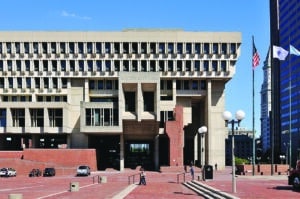A proposal for a top-to-bottom revamp of Boston’s Zoning Board of Appeals unveiled Monday was greeted with hesitancy and skepticism by real estate industry leaders.
Boston City Councilor Lydia Edwards’ proposal contains three main thrusts: Remove real estate and construction industry representatives from the board, make it easier for the public to follow – and appeal – ZBA decisions and make developers seeking variances submit plans on how they will mitigate displacement of their project site’s current residents.
Boston Mayor Marty Walsh’s administration has contracted the law firm of Sullivan & Worcester to review of ZBA policies and administrative practices following a scandal where a BPDA employee took a $50,000 bribe from a developer to influence a ZBA vote on the developer’s project. When the review was announced, Walsh’s office promised it would “inform any opportunities moving forward for how to institute even stronger operational controls and accountability at the ZBA.”
“The Greater Boston Real Estate Board just got a copy of it today and we are evaluating it,” GBREB President Greg Vasil told Banker & Tradesman in an email. “Our preliminary thoughts are that in all the city’s boards and commissions their should be balanced representation. We will study this proposal with that in mind.”
Edwards’ proposal would remove 60-year-old system where seats on the board are reserved for industry groups like the Boston Society of Architects and Greater Boston Real Estate Board. Under the proposed new structure, members and alternate members (seven each) of the ZBA would represent perspectives from affordable housing, civil rights and fair housing, environmental protection and climate change, urban planning, homeowners, renters and expertise in zoning and state law. People engaged in the construction, development, purchase or sale of real estate could not be on the board.
The head of the state’s commercial real estate trade group said her group was “deeply concerned” by some elements of the proposal.
“In short, it seems very premature to file anything at this time given the ongoing review,” NAIOP-MA CEO Tamara Small said in an email. “We applaud the city for retaining Sullivan & Worcester to review the ZBA and we look forward to reviewing their findings. We believe that such dramatic changes to the ZBA, based on the actions of two individuals, is not prudent at this time. Furthermore, we are deeply concerned about a ZBA that would ban anyone with real estate experience from serving as a member. Given the technical nature of the work of this board, an understanding of real estate development, construction and design are absolutely essential for board members.”
Edwards’ home rule petition, which would first have to be passed by the Boston City Council before then being passed by the state legislature, elicited different reactions among Boston’s political leaders.
“These issues are at the center of the mayor’s outside review of the Zoning Board of Appeal. Mayor Walsh will act swiftly on their recommendations and we welcome Councilor Edwards collaboration as we move forward,” a spokesperson for Walsh’s office said.
At-large City Councilor Michelle Wu, who has staked out a position as leader of the city’s progressives on real estate and other issues, was more enthusiastic.
“Thank you, @LydiaMEdwards,” she tweeted Monday. “Looking forward to supporting much-needed ZBA transparency reforms as part of our work to reshape planning & development to match community needs.”







